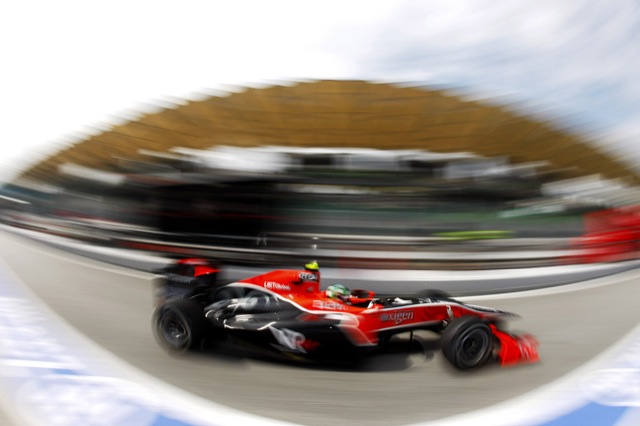The intended introduction of a voluntary £40m budget cap has caused a lot of teams to think long and hard about the future of Formula One and their involvement in it. Since the FIA announced the idea, the plan has undergone some tweaking, the original cap being set at £30m and including everything bar the kitchen sink (erm, motorhome). Now set at £40m, and not including many other costly items, it was thought that the teams would agree to the idea. Alas not, and FOTA are still asking for further discussion on the matter.
The budget cap would essentially split Formula One into two tiers; those who are capped and those who are not. In an attempt to make it fair, the FIA stated that those not choosing to cap their spending would have to follow the proposed rules which are a continuation of the current set and include rev-limited engines and a strong grip on the development of other parts. Those who choose to cap their budgets would be given greater technical freedom and development opportunities.
FOTA have said that they urgently need to open discussions with the FIA, implying that they are not happy with the way this system will split the sport. A few team bosses have voiced their disgruntlement towards this in the build-up to the Spanish Grand Prix in Barcelona, and the urgency comes about because the deadline for entry into the 2010 Formula One World Championship closes on May 29th. Some teams, it would appear, are not ready to commit to next year’s campaign because of this budget cap issue.
Toyota became the first to implicitly say this, with the team’s president, John Howett, speaking to Autosport about his squad’s future involvement in the sport. And while Toyota may have been the first, it is suggested that Ferrari are not too far behind and are said to be evaluating the possibilities of a future away from Formula One.
Under the rules as they are published, we cannot submit an entry. There are concerns about the governance process within the sport, that there are clearly prescribed areas of discussion within the sporting and technical rules and we don’t feel they are being complied with.
From Toyota’s perspective there are a number of concerns that really need clarifications before we commit to the future. We want to be here. We believe we have been a good corporate citizen within the F1 environment, but now we must reflect long and hard on what we do in the future.
I would say it is very likely we won’t enter unless something changes significantly.
Our real heart is to remain in F1, but now we have to start considering what are the best alternatives and discussing with the other manufacturer teams what their opinion is and what their intentions are. John Howett.
The manufacturers would like to see costs reduced, as would the private entries as well. However, by creating a split in the way the teams are run, budgeted and ruled could lead to further problems on the track with performance. With greater freedom to develop new parts, a capped team could discover something which could put them far ahead of any other team. The other capped teams would then copy and implement (much like the recent diffuser issue), resulting in a gap forming between the two levels. Already in 2009 we have seen the difference between Brawn and the others, and everybody is currently reading from the same rulebook.
We are also assuming, regarding the potential performance split after capped teams development, that the FIA will get it right to begin with. If the FIA do not start the scheme off with the teams running vaguely equal, then development will only add to this. And to be perfectly honest, when have the FIA ever got anything right from the word go?
There is also a matter of policing, and although the FIA is setting up the Costs Commission to oversee this, David Coulthard commented on the BBC’s qualifying coverage earlier today that he can foresee capped teams being quite imaginative with the way they deal with some of their finances should this scheme go ahead.
In reality, the way to deal with this problem is far simpler than the FIA is making it. If capping budgets is necessary to ensure the survival of Formula One (and I’m not overly convinced it is, but I can see the merits in it), then simply enforce a standard cap on every single competitor. If you want to compete in Formula One, you will have your finances picked apart by the Costs Commission, and the total must not exceed x-amount, which is the same for everybody. If on the other hand you do not want to have your budget capped, either don’t join the sport, or if you’re already a competitor, then leave. But the rule has to be the same for everybody. Every. Single. Team.



















The FIA cannot make the rule mandatory – the terms of their settlement for anti-competitive practices with the EU preclude them from commercial terms to the teams. The only way they can introduce it is to make the teams sign up voluntarily.
Then budget caps now seem silly to me, simply because I feel that it should be one rule for all teams.
Thanks for the info Don, I didn’t think about that until you pointed it out.
The way the FIA has written this rule, no team can opt into it unless it can do the following:
a) predict exactly who they will employ as “key” staff 12 months in advance
b) predict exactly who will be supplying them 12 months in advance
c) if the WMSC is to seal the championship at the same time as all other FIA championships, reveal their exact spending for the year at least two months prior to the end of the year to which the expenditure refers
d) ensure they are not based in a country that precludes third-party non-voluntary auditing for the performance of an option within a contract (for example, Holland)
e) ensure there are no trade or supplier deals with any country fitting the description of d)
f) ensure it has not already spent more than £23m this year on a 2010 car or anything that could be carried over to the 2010 season. This includes new teams which don’t yet have production facilities.
g) doesn’t have labour laws preventing the shedding of vast numbers of employees (e.g. Germany)
h) aren’t based in a country where forcing a limit on some wages and not others could be construed as illegal (I can’t think of any of the top of my head, but I bet there’s at least one, and the law of stupid consequences means it will probably be a country F1 cares about in some way), or prevents people from being dismissed simply because a third party that has no legislative power said so (I believe this includes Germany and possibly the whole of the EU)
i) aren’t based in a country where third-party investigations of the types the FIA wants to do are illegal
j) ensure that they know 12 months in advance the exact movement of the pound against all currencies that may be necessary in order to fulfil the various contracts they will have for suppliers.
If you can find me a team that could meet all ten criteria, then I might consider the budget cap as currently proposed to be workable. Until then, this is merely a test of who can be bothered to read and understand the regulations before signing up and who can’t. (Is this why fines aren’t included in the cap?)
[…] Motorsport president John Howett’s comments from the Spanish Grand Prix last weekend about not wanting to participate in a two-tier Formula One, Red Bull owner Dietrich Mateschitz has also added his concerns to the growing number of outfits. […]
[…] in the Formula One World Championship. The meeting came about after the FIA introduced a voluntary £40m budget cap in order to reduce costs and bring the level of entry down in the sport. However, like Toyota and […]